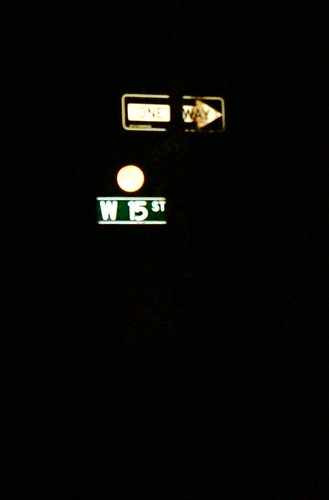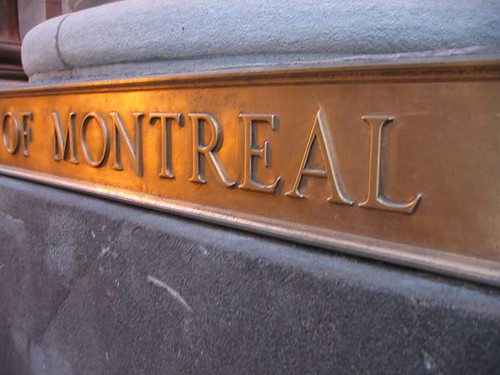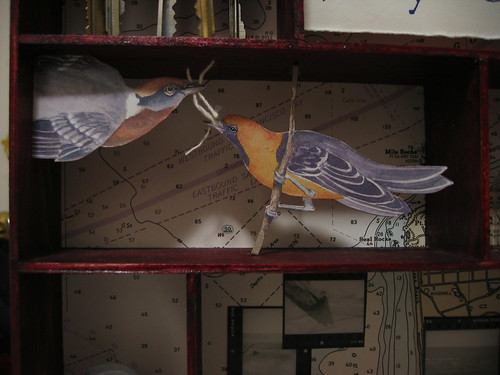The headline for this too-long post is the full text of an e-mail I sent earlier this week to
the wife of
an old friend, upon learning that, like me, she'd been reading
Roberto Bolano's
The Savage Detectives, and, like me, had been flat-out raving to her spouse about it. At that point, with only about thirty pages of 648 left to go, critical thinking was nearly impossible, a shriek of sheer astonishment all I could muster.
A couple of days later I'm still a bit gobsmacked. If you'd described the bare bones of Bolano's novel to me--young Bohemian Mexican and South American poets wander Mexico City and the world smoking, drinking, fucking, disputing about poetry, and cadging money to support those activities--I would never have imagined it to be my kind of book. I read
On the Road at twenty-one and
hated it, seeing in it little but the sort of feckless abandon that would have gotten me fired from any of the three jobs that were helping me stay in college. If you'd added a description of Bolano's rushing and tumbling prose style, the digressions within digressions, and the seeming formlessness of the first hundred or so pages, I would have quietly set the book down and walked slowly out of the bookstore. In fact, the hints of those characteristics that came through in the numerous laudatory reviews the book received on publication in English were--along with a reluctance to join the burgeoning Bolano bandwagon--enough to keep me away from the book for a full year.
Yet here I am, absolutely enthralled by what Bolano's achieved. I could try to explain it--how, in an act of preservation worthy of Proust, he resurrects a lost world of poets and failed rebels, presenting a milieu, an ethos, and a demimonde that weren't even ever well-enough known to be considered long-forgotten; how the chorus of voices he develops through the oral histories of the novel's middle section offers story after story about the ways people try to live with their art and their ideals in a world that cares little for either; how without being overtly political, he conveys the dread and danger of South America's 1970s collapse into totalitarianism and destruction; how he invests the book's two central (yet largely absent) characters, the elusive poetic champions Ulises Lima and Arturo Belano, with a complexity and a mystery that renders their persistence in the memories of those who knew them completely convincing; how he wields his prose, especially at the end of each interpolated minor story, with the precision of a cruel neurosurgeon, eliciting gasps of horror, amazement, and simple, unadulterated empathy; how by simply
not mentioning a character for four hundred pages he forces us to accumulate terrifying reserves of dread; of how he truly convinces us that poetry can
matter--but others have described all that at length. If you want more of that sort of detail,
Scott Esposito wrote well about
The Savage Detectives in the Quarterly Conversation,
Daniel Zalewski wrote about it for the New Yorker; and Benjamin Kunkel covered the book for the
London Review of Books. And there's more where those came from.
Instead, as I continue to bob in the eddies of Bolano's masterpiece, I'm inclined to just share some disconnected thoughts.
1 I've long held to a theory--the sort that's quite fun to propound, so long as one is ready to simply fold under sustained critical assault at, say, a successful cocktail party--that when an American writer sends his or her characters to Mexico, a reader might as well close the book: nothing more of value is going to happen. Mexico as a symbol is just too tempting, serving as a crutch to help writers set up dramatic thematic oppositions, to force their too-civilized characters to confront their more elemental selves. In the heat and poverty of Mexico, where life is cheap and tequila cheaper . . . you get the idea. {Note: this does not apply to writers who
begin their stories in Mexico. Thus
The Adventures of Augie March, after its bravura opening half, gets chucked;
The Power and the Glory does not. The only novel I can think of off the top of my head that escapes this trap is
James M. Cain's
Serenade--and it only squeaks by because its larger concerns are elsewhere.}
Obviously that rule wouldn't apply to Mexican (or, it doesn't seem unreasonable to think, South American) writers. But one of the most interesting aspects of
The Savage Detectives is that, much as long stretches of it are about living a bohemian poet's life in Mexico, the country itself is in an odd way not that central to the novel: there's none of the sense of deep-rooted corruption and failed revolutionary ideals that one gets in
Carlos Fuentes, for example, and while there are hints of the ghostliness of
Juan Rulfo, ultimately Mexico is simply another stop on the anti-bourgeois world circuit of crummy apartments and beater cars and bad neighborhoods that serve as the unwilling refuge of Arturo Belano, Ulises Lima, and their ilk, from Paris to Israel to Liberia to San Diego. Mexico City is perhaps more compelling, more unforgettable than those other places because the poets' circle of compatriots and enemies is ultimately concentrated there, woven into the very fabric of the streets and cafes. But the book--like its subjects--is too big for Mexico alone; it is determined to encompass the world.
2 The Savage Detectives is crammed with names of poets and their books, ranging from the well-known (the oft-derided
Octavio Paz) to the lesser-known (Did
Kenneth Fearing really write poetry?
Apparently he did, and it was translated into Spanish.) to those who, to an English-speaking reader, might as well be made up. If I were slightly more energetic, I'd go to the trouble of making notes of all the names in order to determine whether any belong in
the Imaginary Library; as is, I'll let them be, unknown and uncertain, a testament to Bolano's fascination with the failed and forgotten, the detritus--deserved or not--of literary ambition. {But the Imaginary Library is a collaborative project, so if anyone has the patience and time . . . }
3 Near the end of the novel, Bolano deliberately puts his book-long litany of lost poets into perspective by throwing out a similar list of forgotten bullfighters. Each art has its heroes and stars, but the obscure toilers are essential, too; one way to read
The Savage Detectives is as one big tip of the cap, or a nearly futile valentine, to all of them. I'm awed by
Albert Pujols, but there'll forever be a place in my heart for
Miguel Mejia, too.
4 The constant wanderings of Bolano's characters give me the urge to get a giant map of Mexico City and map out their various paths and note important nodes. In his
Atlas of the European Novel,
Franco Moretti did that for a batch of books, most notably
Dickens's
Our Mutual Friend, to great effect; I wonder what we'd learn from seeing a map of Bolano's Mexico City?
5 Or of the world--encompassing the characters' travels to Sonora, San Diego, Los Angeles, Paris, Barcelona, Madrid, the Costa Brava, Tel Aviv, and unknown locations between. What would such a map show us about Bolano's vision?
6 The Savage Detectives also makes me want to write poetry. Which, if past performance guarantees future results, would be a bad idea.
7 And it makes me want to read
Malcolm Lowry's
Under the Volcano, some lines from which form the epigraph to Bolano's novel.
Despite being grotesquely fascinated by Lowry's life, I've stayed away from his masterpiece because of the hardcore hatred of a couple of trusted friends--but Bolano may have sold me. We'll see.
8 It also makes me want to believe Bolano when he writes:
[C]onversations in bed do oscillate between the cryptic and the transparent.
and
Ah, what a relief to come into the the light, even when it's a shadowy half-light, what a relief to come where it's clear.
and
[N]o, I'm not anybody's mother, but I do know them all, all the young poets of Mexico City, those who were born here and those who came from the provinces, and those who were swept here on the current from other places in Latin America, and I love them all.
and
If you add infinity to infinity, you get infinity. If you mix the sublime and the creepy, what you end up with is creepy, right?
9 Possibly more than all of these things,
The Savage Detectives makes me want to give away copies, a project I've already embarked on, having just this evening given away my first copy to
my friend Erin. If she enjoys it a third as much as I did . . .
Sorry,
Helen DeWitt, but this book might (at least temporarily) replace
The Last Samurai as my default gift to friends who are serious readers.
10 Finally . . . could there be a better book with which to kick off summer? Especially here in Chicago, where we skipped spring and went straight into,
if I may steal a line from Scott at erasing.org, "atomic rainforest"? Summer reading--regardless of what the book review supplements would have you think--should be all-encompassing, unforgettable, world-changing, creating a sort of internal sweat commensurate with the external.
One usually ought to avoid harking back to high school, but when thinking of summer reading, one could do worse than to remember the vast changes in worldview that were possible over a summer when one was sixteen, the drama and force that could be packed into those three months. September rolls around, and you're a different--and, one hopes, a better--person.
Summer reading: aim high; read Bolano.










